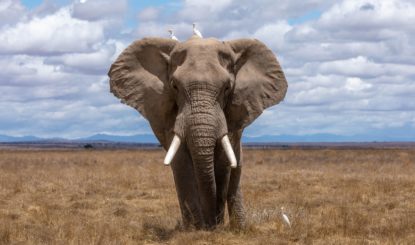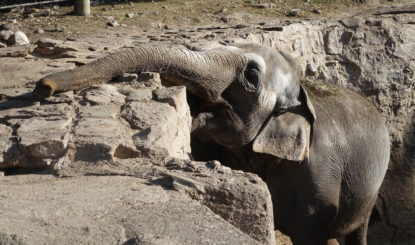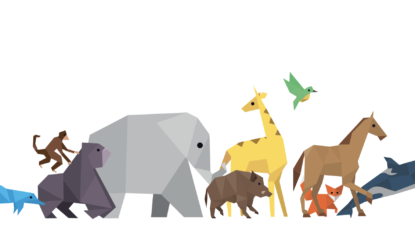Argentina: Elephants in captivity will soon be the past
Our campaign to save elephants from Argentinian zoos is making good progress: Two Asian elephant cows, mother and daughter, have been relocated from the Mendoza Ecopark to our partner sanctuary in Brazil.
After the relocation of Mara in May 2020, it is now Pocha and her daughter Guillermina’s turn to put their feet on the ground of Mato Grosso to enjoy fresh grass and freedom for the first time in their lives after an existence of deprivation. As you can imagine, to relocate not just one elephant from one country to another, but two, is no easy task.
International Cooperation
Despite our strong determination, we would not have gotten far without the cooperation and expertise of the Global Sanctuary for Elephants, where our elephants now live a happy life. This sanctuary, which specializes in saving pachyderms, is run by the famous NGO ElephantVoices.
Only Stone Walls
Just like Mara, Pocha and Guillermina have also been through hell. All three come from the same place: the Mendoza Zoo, renamed “Mendoza Ecopark” after its commitment to release its pachyderms into the wild. For more than twenty years, the view of the two elephant cows was limited to a stone wall. Yet, they were born to live in a herd and travel dozens of kilometres every day.
For many years, the Mendoza Zoo, one of the oldest zoos in Argentina, turned a deaf ear to the suffering of these animals. For a long time, the zoo, which was built on a slope, constantly added new species to attract more and more visitors. To compensate for the steep slope, some enclosures had to be built in pits and caves to optimally use the space – at the expense of the animal’s well-being, of course.
Progress Ecopark
Thanks to the mobilization of animal welfare activists, Argentinians gradually became aware of the fate of animals held captive in zoos. This put a lot of pressure on zoos. In 2016, following the passing of a law by the province of Mendoza, the Mendoza Zoo was transformed into an ecopark, led by a new director who is determined to offer the animals a better future. Her name is Mariana Caram, a passionate advocate of animal welfare. Her mission is to improve the conditions of the animals living in the park and – whenever possible – to gradually organize their relocation to appropriate sanctuaries.
The Opportunity
In its role as mediator and facilitator, Fondation Franz Weber (FFW) introduced Mariana Caram to Scott Blais, the co-founder of the Global Sanctuary for Elephants. Together, they were able to find a solution for the captive elephants of Mendoza. The timing was perfect: Scott Blais happened to be in Brazil looking for a site to build a sanctuary for South America’s pachyderms living in captivity – the future Brazilian Sanctuary for Elephants. Mariana, who was enthusiastic about his project, immediately supported him. On the spot, she signed a letter of intent, committing to send four elephants from the former zoo to Brazil as soon as the new sanctuary would be ready for the animals. The goal was to move Mara, Guillermina and her parents, Pocha and Tamy, as well as Kenya, the only African elephant at the Mendoza Zoo, to Brazil as soon as possible.
A Long Way to Freedom
The life of these unfortunate animals was full of suffering. Pocha, for example, arrived in Mendoza in the 1960s. At only four years old, she was relocated from Germany and lived for a long time with Tamy, an Asian elephant that came to the zoo when a circus had no more use for him. After some time they had a daughter, named Guillermina. From then on, the little family’s life went downhill. To prevent further births, the zoo decided to separate Pocha and Tamy and confine the two females in a tiny enclosure of only 300 square metres, where they were separated from Tamy by an iron door. Only through a small gap between the bars, they could communicate with each other.
Teamwork Coordinated and Funded by FFW
After so many years in captivity, the elephant cows had to be carefully prepared for their new life to help them adapt. Without prior training, it would have been impossible to send them on a journey of several days and then suddenly release them into the wild.
A team was quickly assembled to coach the elephants. Thanks to the funds generously provided by FFW, experts from the Brazilian sanctuary were able to train the mother-daughter duo to undergo all the medical examinations (especially blood tests) required to obtain an international health certificate – a prerequisite for crossing the border into Brazil. Additionally, mother and daughter had to be prepared to be separated during the journey, as transport in individual containers was essential for their comfort and safety.
Positive Reinforcement
Getting an elephant to cooperate without traumatizing it is a real challenge that requires time, a lot of patience and, above all, heaps of treats! In the case of Pocha and Guillermina, it was also necessary to take into account the difficult-to-access site where they lived. Without any construction, it was impossible to move the containers into the pit to conduct the training. The enclosure therefore had to be adapted for the training and a wall had to be torn down. Once the containers were in place, it took a full year for the elephant cows to learn to climb in and out of them.
After a year, Pocha and Guillermina were finally ready for the big journey. The elephant cows were so familiar with their transport cages, they even played with them! Nothing was left to chance: Mother and daughter were facing each other during the transport so they could see and communicate with each other during the five-day journey to the sanctuary.
The Journey of Their Lives
Accompanied by their keepers, the team of the sanctuary and two members of our team (Federico Sordo and Leandro Fruitos), Pocha and Guillermina were able to start the long journey to their new life. After a five-day journey that included stops every two to three hours, mother and daughter finally arrived at their new home. But when they arrived, Pocha could not be persuaded to leave her container. For more than eight hours, she remained depressed in her cage. So Guillermina made the first move! Reassured by the presence of her daughter, Pocha finally decided to follow her into freedom.
Scarred by Their Old Life
Unfortunately, captivity has left its mark on these animals: It took several days for Pocha and Guillermina to venture out of the comfort zone they had established around the containers, despite attempts by other elephants in the sanctuary to approach them. Pocha and Guillermina have lived in their bubble too long to open up to new stimuli in just a few days. It will take time for them to reconnect with their instincts and develop joy in living in a vast space.
Although this slow progress is somewhat frustrating for our team, who put all their efforts into the happiness of these animals, our partners note small progress: For some time now, when they feel the soft sand under their feet, the elephants poke it with their trunks and sprinkle sand on themselves – a sign of happiness and well-being. The most important part is done. Now they have their whole lives to learn how to live
| After the successful relocations of Mara (2020), Pocha and Guillermina (2022), we will not rest. We are already working hard to prepare the transport of other elephants to the sanctuary. The next passengers for the trip to Brazil are Kenya, an African elephant also from the Mendoza Ecopark, Kuki and Pupi, two African elephants from the Buenos Aires Ecopark, and finally Tami, Guillermina’s father. Their relocation is symbolic: they are the last elephants held captive in Argentina. Once they are safe, Argentina can be proud to be a country with not a single elephant in captivity! And we don’t stop there: So many other elephants behind bars in South America dream of a better life! To give these animals back the freedom and dignity that man has stolen from them is the least we at Fondation Franz Weber can do. |


